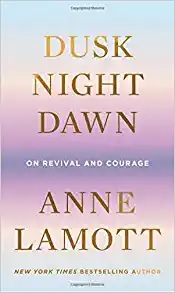In her new book, Dusk Night Dawn, Anne Lamott writes of dread.
*****************************************************************************************************************************
“My parents did not hire her to keep me small and obedient, to keep me separate from all of you and all of life and most of me.
I hired her.
I was three or four.
She was my most reliable companion, always there for me, like God in a bad mood.
She looked like a tall, thin Greek goddess you wouldn’t want to tangle with.
Dread taught me how to succeed and why it mattered, how to survive the caffeineted neglect of my home life, the bullying on the blacktop, the equally fraught states of isolation and intimacy.
She kept me in line, helped me to be someone everyone would like. She got me to where I am today.
It has always been hard for her to let go of me and for me to let go of her, because I might die or disappoint my parents, now long dead. It does seems she has loosened her grip somewhat in the third third.
She is still my default in fearful times like these, when I am stunned by the powers that be, by the UN climate report and the pandemic, by dying friends who are younger than I, sometimes much younger.
Even though I know from God, from precious community, and from various calming spiritual practices that heal and hold during catastrophic weirdness, she refuses to cede control.
Even though I know the extreme hardships Dread and I have already come through — I know that somehow, against all odds, we somehow always seem to — she steps in to offer her cranky thoughts on just how utterly fucked and inadequate things are…. beginning with me.”
*****************************************************************************************************************************
So good.
Some Christians might respond to this dread stuff, “But PAUL SANG IN PRISON!”
They would also say, “Don’t you know about the glorious inheritance? What is there to dread?”
Yes, we know that, but Jesus also fell to his knees in utter dread, and begged the Father to take his cup of suffering away.
Jesus knew better than we ever could the glorious inheritance that awaited the end of his journey, he knew that it was just a few days away, and yet he still felt horrific dread over the few days that remained.
In light of that, we shouldn’t let the “PAUL SANG IN PRISON!” chorus shame us for our dread.
And if prison came for any of us, we’d probably sing sometimes too. And despair. And laugh too. Because we’d be human there, just like we are, outside of prison.
And so just because we have a snapshot in time where Paul sang in prison in Philippi doesn’t mean he spent his other times in jail like a Rodgers and Hammerstein musical.
Dread is a symptom, by the way, of generalized anxiety disorder.
In my mind, it’s the worst of all, because so often, we just don’t know where it comes from.
The 19th century Baptist preacher Charles Spurgeon put it this way.
“There is a kind of mental darkness, in which you are disturbed, perplexed, worried, troubled – not, perhaps, about anything tangible.”
Sometimes I wake up dreading nothing, and that scares me more than dreading something.
It’s a disturbing mist that never settles, one that you know won’t turn into anything, but you’re sure it will, but know it won’t.
Ever seen a film where the hero looks every which way for the encroaching villains, but it’s just quiet and he’s in a panic until suddenly the director sics every CGI monster on him. Then he’s okay because he’s got the skillz and man-bun, updo, whatever those guys have to take care of the situation in a few minutes.
But living with dread and an enemy that never comes is like a horror movie with no monster. You’re constantly circling, waiting, and dreading, and then it’s time to die from natural causes when you’re old.
There’s no better euphemism for death than, “rest in peace,” and no more thrilling description in the Bible than “eternal rest” for those of us with dread and anxiety.
Until then, we talk to our doctor about medicine, we talk to counselors about our lives, we cry to God, “Son of David have mercy on me,” we do whatever we can to help, and remind ourselves that to dread is part of the human condition and there is no sin in it, or else Jesus would have been a sinner, as well.

